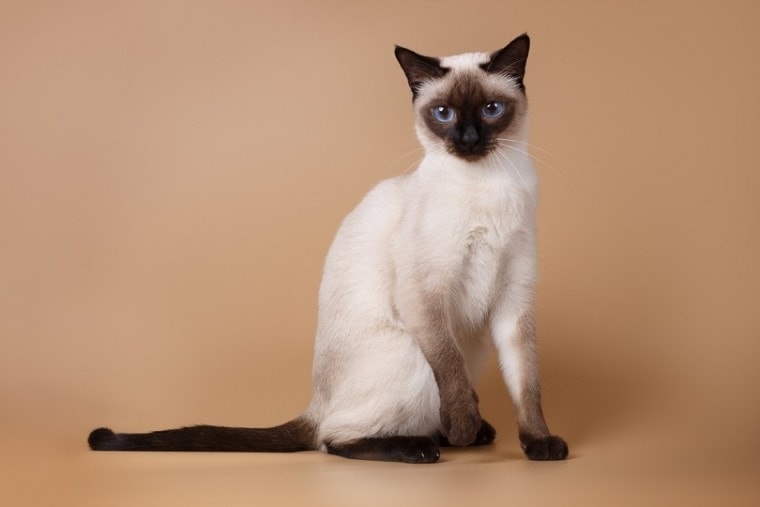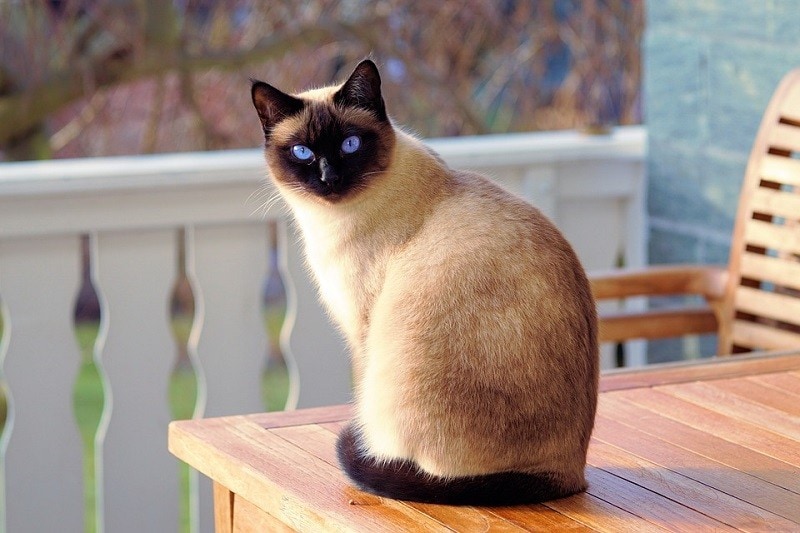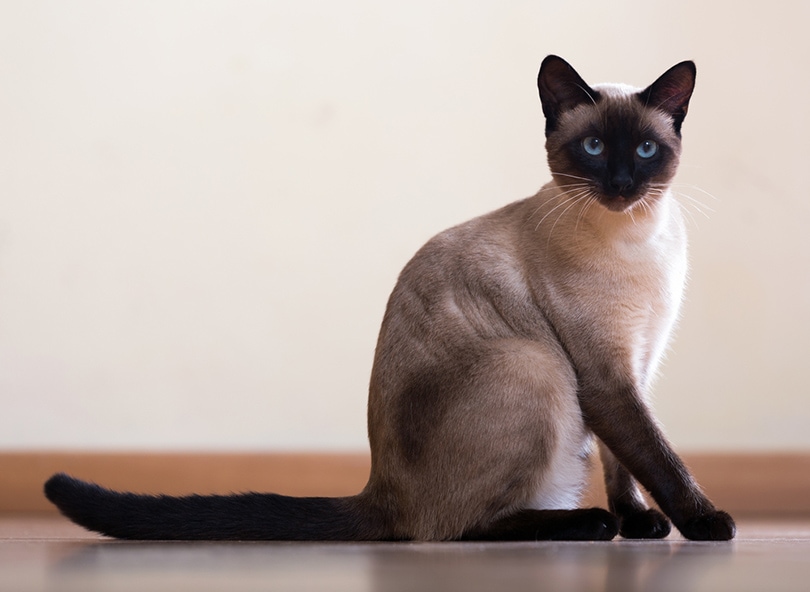
Click Below to Skip Ahead
Siamese cats—affectionately known as “Meezers” for their chatterbox tendencies—make for some of the best furry companions one could possibly want. This delightful breed originates from Thailand, where its likeness first appeared in an ancient book of cat poems called the Tamra Maeo, or “Treatise on Cats”. This manuscript likely dates back to the Ayutthaya period.
Breed Overview
Height:
8–12 inches
Weight:
8–15 pounds
Lifespan:
15–20 years
Colors:
Chocolate point, seal point, lilac point, blue point
Suitable for:
Any kind of loving family or cat parent
Temperament:
Affectionate, sociable, trusting, expressive, intelligent, fiercely loyal
Siamese cats are, in themselves, something of a work of art. With beautiful, sapphire-like blue eyes, a slender, muscular physique, a variety of point colorations, and a massive personality to boot, it’s no wonder so much intrigue surrounds this breed. If you’re considering adopting a Siamese, this post shares all you need to know about this very special breed of cat.
Siamese Cat Characteristics
Siamese Kittens

Siamese cats are pretty sought-after, resulting in finding these cats are very high prices. Instead of buying a Siamese cat from a breeder, you could try adopting one instead. Adoption agencies and rescue centers sometimes charge an adoption fee, but it’s significantly less than what breeders charge and the money goes toward helping other rescued cats.
When you welcome a Siamese cat into your home, expect to have a loyal and affectionate cat by your side. They love human company and are great for people looking for a feline companion to spend lots of time together.
Temperament & Intelligence of the Siamese Cat
Siamese cats certainly aren’t short on personality. They’re often extremely affectionate and aren’t afraid to show it—sometimes to the point of clinginess. If you’re looking for a cat that’s a little more independent, the Siamese might not be the best choice for you. Not every Siamese will be clingy, but most become very attached to their people and will want to be around them as much as possible.
As mentioned, Siamese cats are not only expressive in the sense that they’ll want to cuddle with you a lot. Some are also very vocal and will happily have a back-and-forth conversation with you. They won’t hesitate to let you know if they’re not happy with something, either. This is pretty adorable and is one of the traits that make Siamese cats so special. If you find chatty cats irritating, don’t go for a Siamese!
Another endearing Siamese trait is their high intelligence. They enjoy playing with their people and can even learn to play games like “fetch”. If the Siamese is not adequately mentally and physically stimulated, they may begin to act out or become destructive.
Are These Cats Good for Families? 👪
Yes. Siamese cats are very loving, playful, and often extroverted, and many are just as happy spending time with groups of people as they are with just one person. They tend to quickly warm to and trust people, so this makes them a good choice for families. As with any breed, though, children should be taught how to gently and positively interact with the Siamese before inviting one into your home.
Siamese cats are prone to separation anxiety and depression if their people are away for extended periods. Because of this, they are better suited to homes in which at least one person is at home at any given time, or where they’re not left alone for too long.
Does This Breed Get Along with Other Pets?
Siamese cats often get along perfectly well with other pets. Of course, it’s easier if your Siamese is socialized alongside other pets from a young age, but Siamese cats are pretty adaptable and adults shouldn’t take too long to get used to other pets that are introduced to them gradually, including dogs. As long as the pets you introduce your Siamese to are non-aggressive, you should be fine. If you have a pet that’s boisterous or aggressive, it won’t be a good fit.
Likewise, it’s probably best to keep smaller pets like rats, mice, or hamsters away from your Siamese. Some Siamese won’t bother your smaller furry friends, but all cats are a risk to pets like this, so they’re best kept apart.

Things to Know When Owning a Siamese:
Food & Diet Requirements 
Siamese cats, like other cat breeds, are obligate carnivores so need an animal product-derived diet. Their diet should be rich in protein, vitamins, minerals, amino acids, and a certain amount of carbohydrates and fats. The easiest way to make sure your kitty is getting all the right nutrients is to purchase a commercial cat food.
You could have a go at preparing your cat food but making sure you’re including all the right nutrients can be time-consuming. You can choose to feed your Siamese wet food, dry food, or, a combination of both. The expressive Siamese will have no problem letting you know what they like and what they don’t, so it shouldn’t be long before you’re aware of their preferences!
Exercise 🐈
The Siamese is an active breed that enjoys climbing, running, jumping, and chasing after toys. If you’re adopting a Siamese sometime soon, it’s a good idea to deck out your home with cat trees and mentally stimulating toys to keep your Siamese entertained. Some cat toys are obstacle-based, and these are great for the clever Siamese as they present them with a challenge.
That said, simple toys are fine to get, too. Siamese cats are as happy as the next cat to chase bits of string, toy mice, or jump for something on a stick. This usually requires your involvement, though, so if you’re busy and your cat wants to play, giving them something obstacle-based that they can figure out alone might be a good alternative.
We recommend setting time aside to play with your Siamese every day. They need this time to release pent-up energy, especially as they’re prone to destructive behavior when bored or lonely.
Training 🧶
Siamese cats are smart and quickly learn where it is and isn’t acceptable to use the bathroom. They also respond well to basic house training, like where and where not to sharpen their claws and what is and isn’t acceptable to use as a toy.
Be sure to provide scratching posts for your Siamese to discourage them from whipping their claws out on your furniture. Use a gentle but firm tone of voice, use their name a lot, and always avoid punishing your Siamese for mistakes as this only worsens matters. They can be pretty stubborn when they want to be and respond far better to positive reinforcement-based methods.
Grooming ✂️
Siamese cats are short-haired, so they don’t require much extra grooming, though it’s often appreciated. As Siamese cats love spending time with their people, a grooming session is another excuse for them to do just that! Once a week should do the trick for helping get rid of dead hairs and skin, but feel free to brush your Siamese more if they enjoy it.
As mentioned, Siamese cats can become destructive if they feel neglected or bored. This is why it’s important to keep their claws dull with scratch posts and/or regular trimming every two to three weeks. This also helps prevent ingrown claws, which can be very painful.

Health and Conditions 🏥
Siamese cats are known for having long life spans—the oldest Siamese cat (Scooter) lived to the age of 30! The average Siamese lifespan is around 15 years, but some make it to 20 or over. However, all cat parents, regardless of breed, should be on the lookout for health issues. As a pedigree breed, Siamese cats are a little more prone to certain conditions, particularly Progressive Retinal Atrophy.
Progressive Retinal Atrophy is a degenerative condition causing the deterioration of the photoreceptor cells in the retina, which causes eventual blindness. Liver Disease is another condition to watch out for, as is Hip Dysplasia and Niemann-Pick Disease—a neurological condition that has been linked to Siamese cats.
Heart disease, kidney disease, gastrointestinal issues, and gingivitis are also common conditions in cats, including the Siamese.
Male vs Female
Male Siamese cats are usually a little larger and heavier than females. Males are also reputed to be somewhat clingier and friendlier, while females are reputed to be a little more independent. There’s no way to attest to the truth of these rumors, though, as they’re just generalizations—females can be just as loving as males, and you can certainly find independent male Siamese cats.
Unneutered males and unneutered female cats have more distinct behavioral differences, though. Unneutered males tend to become very territorial and may mark their territory by spraying. Females tend to get excessively vocal and clingy when in heat. These behaviors settle down in both breeds once they’re neutered or sprayed.
3 Little-Known Facts About the Siamese Cat
1. They’re also known as “Wichienmaat”.
In Thailand, Siamese cats are also known as “Wichienmaat”. The name is a reference to the ancient Thai cats that are the Siamese’s ancestors. According to legend, Wichienmaat were considered sacred in Siam (Ancient Thailand) and spent much of their time guarding Buddhist temples.
2. There are two distinct Siamese cat varieties.
The traditional Siamese and the modern Siamese are the two different types of Siamese. The traditional Siamese has an “apple-shaped” head and a rounder body and eyes. The modern Siamese has a “wedge-shaped” head that is triangular in appearance, they’re more slender than the traditional Siamese and have larger, pointier ears.
3. Siamese cats are often very vocal.
Though we can’t apply a single rule to every cat in a specific breed, Siamese cats do have a reputation for being unafraid of voicing their opinions. This is often true—many Siamese cats love nothing more than a good old chinwag with their favorite people at the end of a long day.
Final Thoughts
If you’re looking for a cat that will be a loving and faithful companion, the charming Siamese could be just the cat you need in your life. One thing’s for sure—you’ll never be without cuddles or good company with a Siamese around. They revel in being involved in everything you’re doing, whether that’s reading a book, brushing your teeth, having a chat about your day, or “helping” you with household chores.
While the Siamese’s affectionate personality is endearing to some, others may find it a tad overwhelming. If this sounds like you, or if you spend a lot of time away, it might be better to consider another breed. If you’re up for an ample amount of love, fun memories, and a whole lot of deep conversations about the meaning of life, though, the Siamese will deliver in abundance!
See Also:
- What and When Is National Siamese Cat Day? Here’s How It’s Celebrated
- Blue Point Siamese Cat: Facts, Origin & History (with Pictures)
Featured Image Credit: Altsva, Shutterstock






